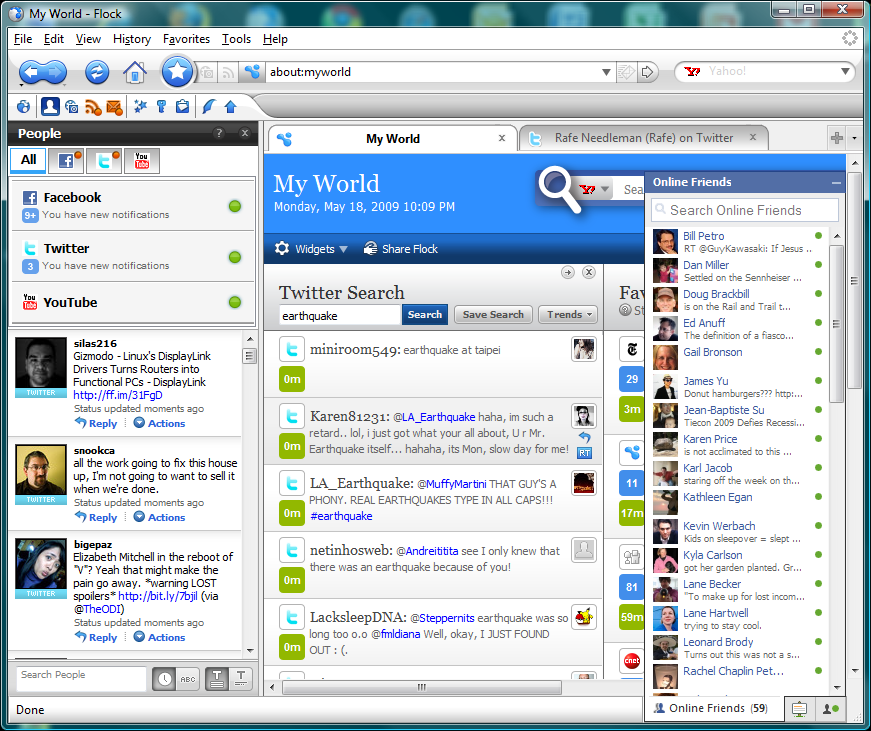Statistically, Flock is probably not for you. This Web browser, the 2.5 version of which is coming out today, is "designed to be the essential browser for the most active 25 percent of users," Flock CEO Shawn Hardin tells me.
You don't generally see browser makers designing their products to not be used by the majority of Web surfers, but this is typical Flock: it's a browser designed for not just Web surfers, but Web crackheads. So far, 7.5 million people have downloaded the browser, and about 1.1 million actively use it.
Flock's differentiator is the way it integrates other services into the main browser frame. While you can layer in some similar features with Firefox plug-in, in Flock, almost everything you'd want to do on the social Web is already built in. And, as Hardin reminds me, all the social features are developed alongside the browser itself, so integration and performance should be more consistent.
The new version adds support for Twitter and provides persistent access to Facebook Chat from any Web page. It even has a Twitter search widget on its home page. It has hooks into other services as well--all told, more than 20, including more social networks (Bebo, MySpace, etc.), media sharing services like Picasa and YouTube, blogging platforms, bookmark organizers, and so on. Some services are better integrated than others. The new Twitter sidebar is very slick, for example, but although the "accounts and services" sidebar has a Gmail option, all it does is log your browser into the e-mail system and load up the Web page.
Also, the browser doesn't offer access to other chat apps besides Facebook. Hardin says that will come soon.
On the other hand the browser's capability to display all your social network feeds in one interleaved list together is very handy. You can also have the browser "Flockcast" to Facebook duplicates of the posts you make to Twitter.
Flock runs social network content down the left side of its application workspace, and runs media content (like Facebook galleries) in a slide viewer across the top. I find this display a bit overwhelming, although all the viewer panes can be hidden. When they're all on, Flock can feel like a social network app first, and browser second. But I like how easy it is to post Web URLs to people in your social network: you just drag a link from your browser over the person's name.
At least Flock uses a good rendering engine. While not yet running at Chrome speed nor using the Webkit engine, Flock uses the latest Mozilla engine, Gecko, the same as in Firefox. Hardin says Webkit is "really interesting, but perhaps not yet enough of an ecosystem." He also says, "We are looking at it and will consider any and all possibilities," for future versions of Flock.
Flock's revenue model is working, for the most part. The company gets a cut of search ad revenues for queries kicked off from the search box built into the browser.
The recession has had an impact: search revenues have slowed. But Hardin is eyeing a new revenue stream: bounties for upgrades from free services (like Yahoo Mail) to their paid upgrades (like Yahoo Mail Plus).
Hardin is right to recognize that Flock isn't for everyone. It's a rich and capable product, but it's based on a different philosophy from other browsers. And it's at the other extreme of the spectrum from Google's Chrome, which eschews site- and service-specific features for a stripped-down interface and a fanatical focus on speed. If you like having specialized, best-of-breed apps for accessing your social networks and for browsing, Flock might not be for you. But if you want to use the smallest number of apps the do the most stuff, Flock--and precious little else--belongs on your desktop.
[via the download blog]


